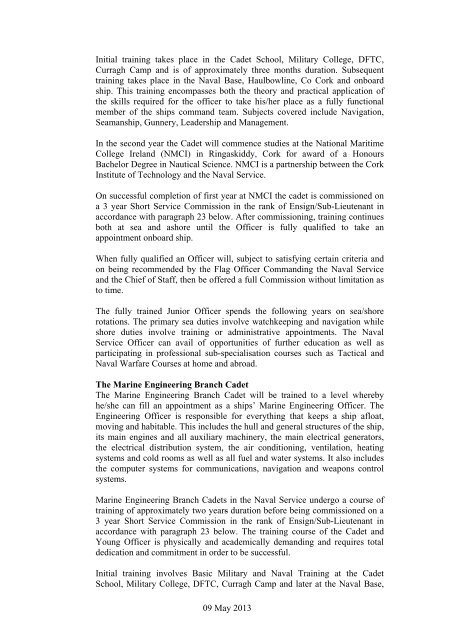09 May 2013 TERMS & CONDITIONS AND ... - Defence Forces
09 May 2013 TERMS & CONDITIONS AND ... - Defence Forces
09 May 2013 TERMS & CONDITIONS AND ... - Defence Forces
- No tags were found...
You also want an ePaper? Increase the reach of your titles
YUMPU automatically turns print PDFs into web optimized ePapers that Google loves.
Initial training takes place in the Cadet School, Military College, DFTC,<br />
Curragh Camp and is of approximately three months duration. Subsequent<br />
training takes place in the Naval Base, Haulbowline, Co Cork and onboard<br />
ship. This training encompasses both the theory and practical application of<br />
the skills required for the officer to take his/her place as a fully functional<br />
member of the ships command team. Subjects covered include Navigation,<br />
Seamanship, Gunnery, Leadership and Management.<br />
In the second year the Cadet will commence studies at the National Maritime<br />
College Ireland (NMCI) in Ringaskiddy, Cork for award of a Honours<br />
Bachelor Degree in Nautical Science. NMCI is a partnership between the Cork<br />
Institute of Technology and the Naval Service.<br />
On successful completion of first year at NMCI the cadet is commissioned on<br />
a 3 year Short Service Commission in the rank of Ensign/Sub-Lieutenant in<br />
accordance with paragraph 23 below. After commissioning, training continues<br />
both at sea and ashore until the Officer is fully qualified to take an<br />
appointment onboard ship.<br />
When fully qualified an Officer will, subject to satisfying certain criteria and<br />
on being recommended by the Flag Officer Commanding the Naval Service<br />
and the Chief of Staff, then be offered a full Commission without limitation as<br />
to time.<br />
The fully trained Junior Officer spends the following years on sea/shore<br />
rotations. The primary sea duties involve watchkeeping and navigation while<br />
shore duties involve training or administrative appointments. The Naval<br />
Service Officer can avail of opportunities of further education as well as<br />
participating in professional sub-specialisation courses such as Tactical and<br />
Naval Warfare Courses at home and abroad.<br />
The Marine Engineering Branch Cadet<br />
The Marine Engineering Branch Cadet will be trained to a level whereby<br />
he/she can fill an appointment as a ships’ Marine Engineering Officer. The<br />
Engineering Officer is responsible for everything that keeps a ship afloat,<br />
moving and habitable. This includes the hull and general structures of the ship,<br />
its main engines and all auxiliary machinery, the main electrical generators,<br />
the electrical distribution system, the air conditioning, ventilation, heating<br />
systems and cold rooms as well as all fuel and water systems. It also includes<br />
the computer systems for communications, navigation and weapons control<br />
systems.<br />
Marine Engineering Branch Cadets in the Naval Service undergo a course of<br />
training of approximately two years duration before being commissioned on a<br />
3 year Short Service Commission in the rank of Ensign/Sub-Lieutenant in<br />
accordance with paragraph 23 below. The training course of the Cadet and<br />
Young Officer is physically and academically demanding and requires total<br />
dedication and commitment in order to be successful.<br />
Initial training involves Basic Military and Naval Training at the Cadet<br />
School, Military College, DFTC, Curragh Camp and later at the Naval Base,<br />
<strong>09</strong> <strong>May</strong> <strong>2013</strong>
















